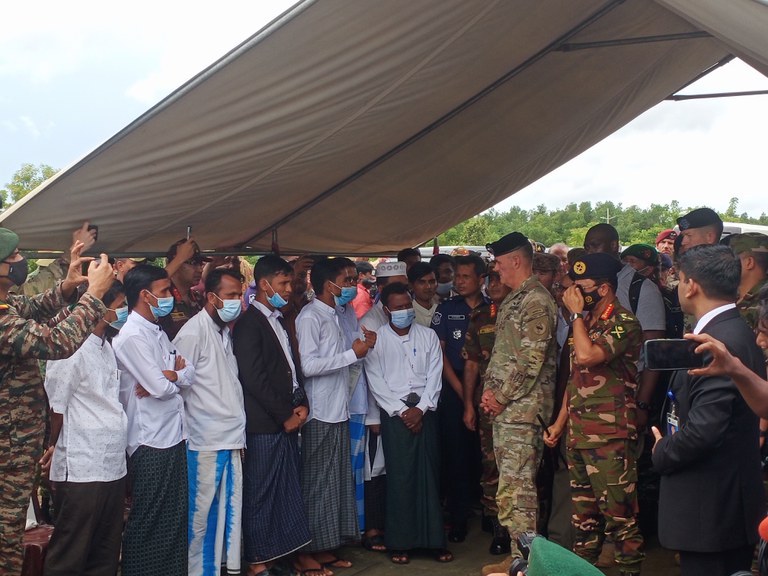French court acquits Cambodian opposition leader in defamation cases
A court in France has dismissed two defamation cases brought against Cambodian opposition leader Sam Rainsy by Prime Minister Hun Sen and a senior police official, but both sides were quick to claim victory in the proceedings, citing elements that advanced their own narrative. The Paris tribunal judiciaire ruled on Monday that Sam Rainsy – a dual citizen of France and head of the banned Cambodia National Rescue Party (CNRP) – was guilty of defamation against Hun Sen when he posted a message to social media in 2019 claiming that the prime minister had ordered the assassination of Cambodia’s former National Police Chief Hok Lundy. However, the court found that Sam Rainsy’s right to freedom of expression trumped the ruling and granted him clemency. Hok Lundy died in 2008 when his helicopter crashed in Svay Rieng province during bad weather, but Sam Rainsy maintains that the aircraft was downed in an explosion. “The correlative factual basis for this imputation [that Hun Sen is responsible for Hok Lundy’s death] is tenuous,” the court said, adding that Sam Rainsy’s statements were made “in a context of denunciation of violations of human rights by a political opponent who … cannot go to Cambodia in order to continue its investigations” of the incident. “Under these conditions, it appears that a criminal conviction would undermine manifestly disproportionate to the right to freedom of expression protected by Article 10 of the European Convention on Human Rights.” The court also ruled that an allegation in Sam Rainsy’s social media post that Hok Lundy’s son, Deputy Commissioner General of the National Police Dy Vichea, was aware of Hun Sen’s involvement in his father’s death and planned to take “revenge” on the prime minister, did not meet the legal definition of defamation. Dy Vichea is also Hun Sen’s son-in-law. “The reference to a political opponent who could have other reasons to dismiss Hun Sen from power does not necessarily refer to recourse to violence but may as well refer to an alliance of a political nature,” the ruling said, noting that Sam Rainsy provided no details in his comments about the details of the alleged revenge plot and its status. “Therefore, in the absence of precision on the projects thus imputed to Dy Vichea making it possible to establish their illegal nature and even to discern their exact content, the remarks do not undermine his honor and his consideration.” In addition to granting clemency to Sam Rainsy, the court dismissed a countersuit by the opposition leader that Hun Sen pay for his expenses related to the proceedings. In a June 2019 Facebook post that prompted the lawsuits against him, Sam Rainsy wrote that “Hun Sen killed Hok Lundy using a bomb placed inside his helicopter … because he knew too much about Hun Sen’s misdeeds.” He also claimed that Dy Vichea “knows well the cause of his father’s assassination” and is “hatching a plan to avenge his father’s death.” The Paris tribunal judiciaire heard both defamation cases against Sam Rainsy in a five-hour session on Sept. 1 before delivering its verdict Monday. Ruling reactions In a statement that followed the verdict, Sam Rainsy’s legal team welcomed the two acquittals, saying that “the French justice system has solemnly confirmed the legitimacy of his actions and defended his freedom of expression.” “For our client, this judgment is much more than a personal victory, but is a ray of hope for defenders of freedom and justice in Cambodia and elsewhere.” Sam Rainsy said Monday that he had won the case, despite the court’s ruling that he was guilty of defamation and then spared. “[The] French court rules that Sam Rainsy wins the case against Prime Minister Hun Sen and his son-in-law,” he said in a post to the Telegram social media network, referring to Dy Vichea. On Facebook, Sam Rainsy characterized the court’s decision as “good news.”. Hun Sen also jumped on the ruling as proof of his “innocence” in Hok Lundy’s death during a speech he made to a university graduation ceremony in the capital Phnom Penh on Tuesday, saying the court found Sam Rainsy’s accusations “baseless and unwarranted” because they lacked evidence to support them. He said Sam Rainsy had failed to provide direct evidence or any testimony through witness affidavits to prove the crash was due to an explosion, and no autopsy report was available to provide the court. “It means that [Sam Rainsy] just made these accusations without having any evidence to submit to court. So the court said that this had nothing to do with Hun Sen,” he said, referring to himself in the third-person, according to a report by the Phnom Penh Post. “What did Hun Sen want from this that prompted him to trouble Rainsy at his home? Hun Sen wants innocence and nothing else. [Rainsy] claimed that they won the case somehow and I don’t know how they can possibly say this.” Hun Sen said he has no intention of appealing the court decision, but would follow along if Sam Rainsy does. Hun Sen’s comments follow those of his lawyer, Ky Tech, who told local media in France on Monday that the court’s ruling showed Sam Rainsy had provided “no clear evidence or confirmation” of the prime minister’s involvement in Hok Lundy’s death. Ky Tech also claimed that the court “also gave another reason to confirm that Sam Rainsy did indeed defame [Hun Sen], which cannot be denied,” without providing further details. Cambodia case The French court’s ruling follows Sam Rainsy’s December 2021 trial in absentia by the Phnom Penh Municipal Court for “falsifying information” regarding the death of Hok Lundy. Sam Rainsy has lived in France since 2015 to avoid what he says are a string of politically motivated charges and convictions against him. The acting CNRP leader tried to return on Nov. 9, 2019 to lead nonviolent protests against Hun Sen, urging Cambodian migrant workers abroad and members of the military to join him. However, his plan to enter Cambodia from…








